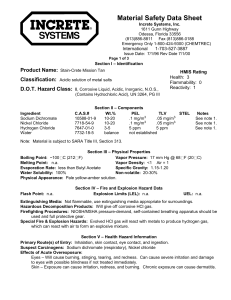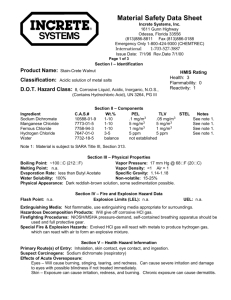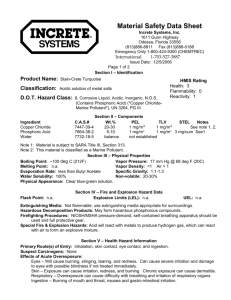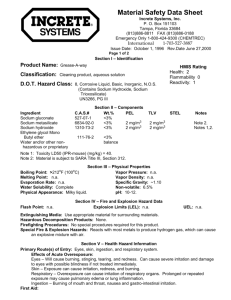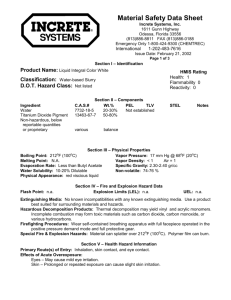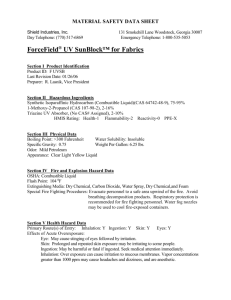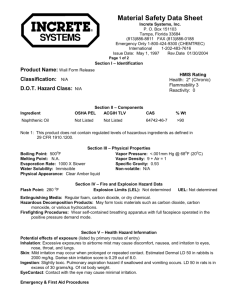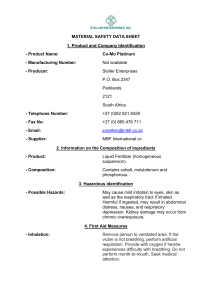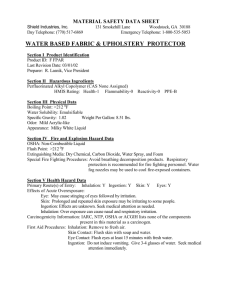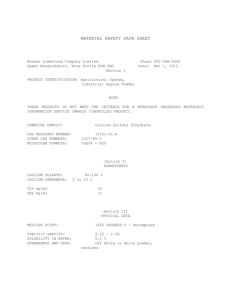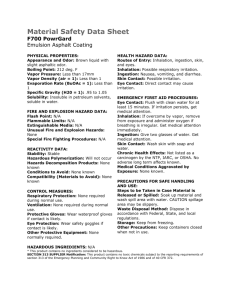Stain-Crete Black
advertisement
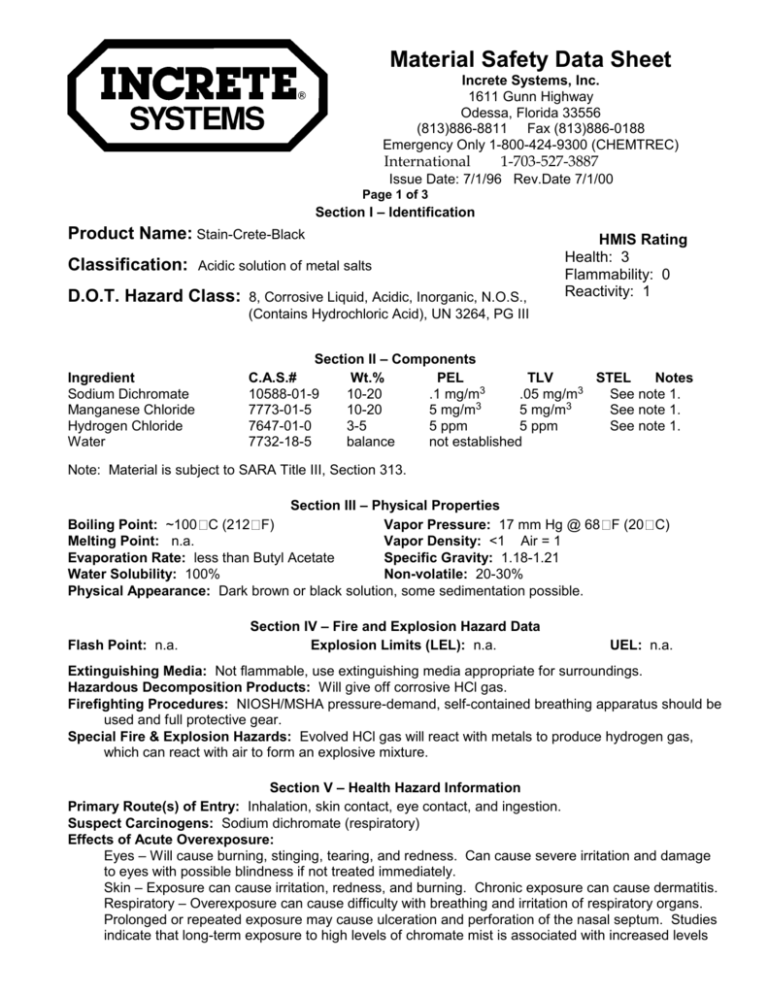
Material Safety Data Sheet Increte Systems, Inc. 1611 Gunn Highway Odessa, Florida 33556 (813)886-8811 Fax (813)886-0188 Emergency Only 1-800-424-9300 (CHEMTREC) International 1-703-527-3887 Issue Date: 7/1/96 Rev.Date 7/1/00 Page 1 of 3 Section I – Identification Product Name: Stain-Crete-Black Classification: Acidic solution of metal salts D.O.T. Hazard Class: Ingredient Sodium Dichromate Manganese Chloride Hydrogen Chloride Water 8, Corrosive Liquid, Acidic, Inorganic, N.O.S., (Contains Hydrochloric Acid), UN 3264, PG III HMIS Rating Health: 3 Flammability: 0 Reactivity: 1 Section II – Components C.A.S.# Wt.% PEL TLV STEL Notes 10588-01-9 10-20 .1 mg/m3 .05 mg/m3 See note 1. 7773-01-5 10-20 5 mg/m3 5 mg/m3 See note 1. 7647-01-0 3-5 5 ppm 5 ppm See note 1. 7732-18-5 balance not established Note: Material is subject to SARA Title III, Section 313. Section III – Physical Properties Boiling Point: ~100 C (212 F) Vapor Pressure: 17 mm Hg @ 68 F (20 C) Melting Point: n.a. Vapor Density: <1 Air = 1 Evaporation Rate: less than Butyl Acetate Specific Gravity: 1.18-1.21 Water Solubility: 100% Non-volatile: 20-30% Physical Appearance: Dark brown or black solution, some sedimentation possible. Flash Point: n.a. Section IV – Fire and Explosion Hazard Data Explosion Limits (LEL): n.a. UEL: n.a. Extinguishing Media: Not flammable, use extinguishing media appropriate for surroundings. Hazardous Decomposition Products: Will give off corrosive HCl gas. Firefighting Procedures: NIOSH/MSHA pressure-demand, self-contained breathing apparatus should be used and full protective gear. Special Fire & Explosion Hazards: Evolved HCl gas will react with metals to produce hydrogen gas, which can react with air to form an explosive mixture. Section V – Health Hazard Information Primary Route(s) of Entry: Inhalation, skin contact, eye contact, and ingestion. Suspect Carcinogens: Sodium dichromate (respiratory) Effects of Acute Overexposure: Eyes – Will cause burning, stinging, tearing, and redness. Can cause severe irritation and damage to eyes with possible blindness if not treated immediately. Skin – Exposure can cause irritation, redness, and burning. Chronic exposure can cause dermatitis. Respiratory – Overexposure can cause difficulty with breathing and irritation of respiratory organs. Prolonged or repeated exposure may cause ulceration and perforation of the nasal septum. Studies indicate that long-term exposure to high levels of chromate mist is associated with increased levels Stain-Crete Black MSDS, Page 2 of 3 of respiratory tract cancer in man, though no studies have indicated increased risk of lung cancer at levels below the current TLV. Ingestion – Burning of mouth and throat, nausea and gastro-intestinal irritation. First Aid: Eyes – Flush with large quantities of water immediately and get medical attention. Continue to flush with water until a physician is available. Skin – Remove contaminated clothing, flush exposed area with large amounts of water. If skin is damaged or symptoms of irritation persist, seek medical attention. Respiratory – Remove individual to fresh air immediately. Give oxygen for labored breathing. If unconscious, begin artificial respiration. Seek medical attention. Ingestion – DO NOT induce vomiting. Give individual several glasses of water or milk, keep individual warm and quiet, and seek medical attention. Section VI – Chemical Reactivity Stability: Material is stable. Hazardous Polymerization: Will not occur. Incompatibility: Avoid metals, reducing agents, alkalis, oxidizers, and organic materials. Conditions to Avoid: Excessive heat. Hazardous Decomposition Products: Hydrogen chloride and chlorine fumes which may further react with metals and other materials to produce explosive hydrogen gas or other toxic fumes. Section VII – Spill Procedures Small Spill: Neutralize with baking soda solution, absorb with inert material and discard. Large Spill: Material will stain surrounding areas. Do not permit runoff. Neutralize unreacted acid with a baking soda solution (when fizzing stops, neutralization is complete). Absorb with inert material or use acid-resistant wet vacuum. Place contaminated materials in labeled containers and dispose. Waste Disposal Method: Dispose of material in complaince with local, state and federal regulations. Section VIII – Special Protection Information Respiratory Protection: Wear approved acid-vapor respirator. Ventilation: Use sufficient local exhaust as needed to maintain exposure below levels listed in Section II. Gloves: Use acid-resistant gloves. Eye Protection: Use splash-proof, chemical-resistant goggles. Other Protective Equipment: Rubber boots and protective clothing are strongly advised. Emergency eyewash, washing facilities and neutralizing solution should be available. Section IX – Special Precautions Handling and Storing: Store containers tightly sealed and upright in a cool, dry, well-ventilated area away from combustible materials, heat, and incompatible materials. Protect containers from damage. Do not reuse empty containers. Wash hands and exposed areas with soap and water. Section X – Supplemental Information The following materials are subject to the reporting requirement of SARA Title III, Section 313: Sodium Dichromate (10588-01-9) CERCLA Reportable Quantity = 10 lb Hydrochloric Acid (7647-01-0) CERCLA Reportable Quantity = 5000 lb Manganese Chloride (7773-01-5) Stain-Crete Black MSDS, Page 3 of 3 This information is provided in good faith and is correct to the best knowledge of Inco Chemical Company, Inc. Inco Chemical Co., Inc. makes no representation as to its completeness or accuracy. Customers are encouraged to make their own determination as to the suitability of this product for their purpose prior to use. Inco Chemical Co., Inc. disclaims responsibility for damages of any kind resulting from the use of this information. No warranty of merchantability, fitness for use, or any other warranty is expressed or is to be implied regarding the accuracy of these data.
